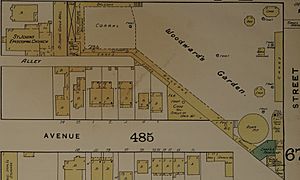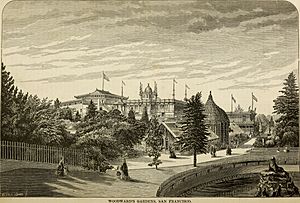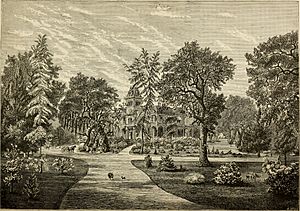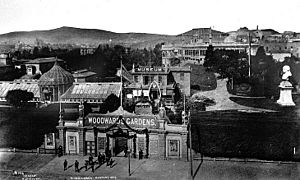Woodward's Gardens facts for kids
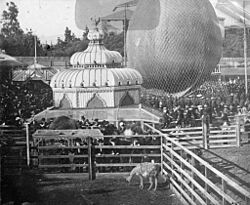
Woodward's Gardens in San Francisco, California circa 1880s showing Gus Buisley’s balloon ascending.
|
|
| Location | San Francisco, California |
|---|---|
| Coordinates | 37°46′05″N 122°25′16″W / 37.768°N 122.421°W |
| Status | Closed |
| Opened | 1866 |
| Closed | 1891 |
| Owner | Robert B. Woodward |
Woodward's Gardens was a very popular place in San Francisco, California from 1866 to 1891. People often called it The Gardens. It was a mix of many fun things: an amusement park, a museum, an art gallery, a zoo, and even an aquarium!
The Gardens covered a large area, about two city blocks. It was located in the Mission District of San Francisco. Today, you can find a brick building and the San Francisco Armory where the Gardens used to be.
Contents
The Story of Woodward's Gardens
Woodward's Gardens was created and run by a man named Robert B. Woodward. He became very rich during the California Gold Rush in 1849. He also owned a famous hotel called the What Cheer House in San Francisco.
Mr. Woodward opened the Gardens on his own large property. He had bought this land from a U.S. Senator named John C. Frémont. After opening the Gardens, Mr. Woodward moved to Napa, California with his family. A famous photographer, Eadweard Muybridge, took many pictures of the Gardens in its early days.
Strange Happenings: The Haunted Windows
In 1871, something very unusual happened in San Francisco. People started reporting "haunted windows." These were windows where strange faces seemed to appear without explanation.
Mr. Woodward collected some of these mysterious windows and put them on display in his museum. One window on Mason Street showed a sad male face. People thought it might be the ghost of the homeowner's husband. Another window on Lombard Street showed an older man's face. These strange sights drew big crowds of curious people.
What Could You Do at The Gardens?
In 1877, a writer named Miriam Leslie visited Woodward's Gardens. She wrote that for just 25 cents, visitors could spend the whole day there. They could walk through shady groves, green lawns, and flowery gardens. There were also lakes, streams, and waterfalls.
Kids and adults could use swings, trapezes, and merry-go-rounds as much as they wanted. It was a place full of fun activities for everyone.
Monarch the Bear
In November 1889, Woodward's Gardens became home to a famous bear named Monarch. Monarch was one of the last wild grizzly bears ever caught in California.
This bear later became very important because he was used as the model for the bear on the Flag of California. More than 20,000 people came to see Monarch on his first day at the Gardens!
Why The Gardens Closed
Woodward's Gardens was very popular, sometimes attracting up to 10,000 people on holidays like May Day. However, after Robert B. Woodward passed away in 1879, the Gardens started to lose its popularity.
It finally closed its doors in 1891. Three years later, in 1894, the Woodward family sold off all 75,000 objects from the collection. A kind San Francisco leader named Adolph Sutro bought many of these items. He later displayed some of them at his famous Cliff House and Sutro Baths in the early 1900s.
Images for kids
 | Janet Taylor Pickett |
 | Synthia Saint James |
 | Howardena Pindell |
 | Faith Ringgold |


